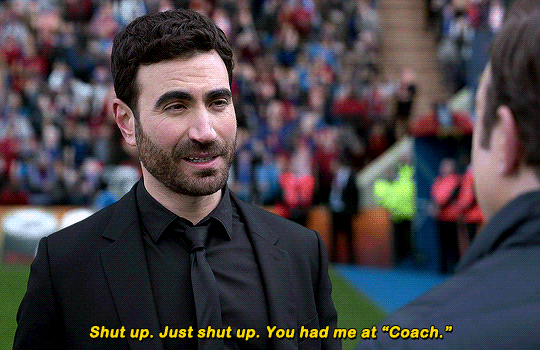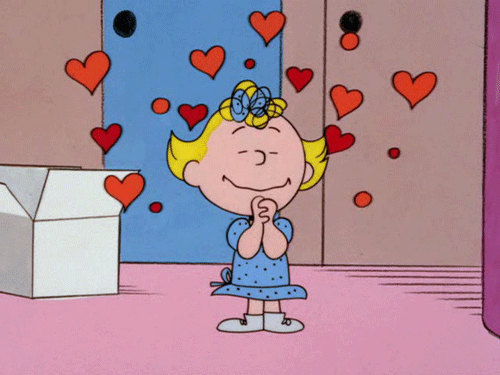Stories about relationships pre-date procedurals, medical dramas, period pieces, goofy shows about nothing, and offbeat shows about female friendship. Stories about relationships pre-date Lena Dunham, Liz Meriwether, Amy Sherman Palladino, Scott Buck, Stephen Falk, Craig Bays, Shonda Rimes, Chuck Lorre, Mindy Kaling, Mike Schur, and all the showrunners in-between. Stories about relationships may only be pre-dated by stories with religious themes (creation stories, etc.) but, I mean, I’m making this point entirely without external sources, so please don’t question me on that. I don’t know which is older.
The point is, relationship stories are old. I read once (I’m pretty sure on Tumblr, if that’s any citation) that there is 0% chance of writing a romance that hadn’t been written before. The tropes all exist; each story is just putting tropes together and then executing them. The magic of the writer is in the creativity of their organization (what tropes do they choose? are they ones that provide for character development or are they ones added for shock value?), the execution (what weight is given to emotional moments – is there too much drama, too little drama, drama for the sake of drama, etc.?) , and the characters behind these stories and whether or not they have dimensions (as if they were real people themselves). That’s why relationship stories will never get old; there are an infinite source of different ways to cook one recipe.
I’m writing this mostly because I miss writing for this website. I love writing. (If you have anything you would like for me to write, please let me know!) I also want to call attention to pairings that might not get as much praise as some other ones because they are inherently low-key.
What I will now do is go over five “relationship types” that I have noticed on TV, especially ensemble series, and how they can work, how they can fail, and instances where I’ve seen them. Cool cool? Cool cool.
A disclaimer before I begin: as I write, keep in mind that I have never and will never claim to be an “authority” on any couple, any TV show, or really anything. Some of these shows I have not watched every episode of, so I am certainly just basing them off of GIFs – when that is the case I will let you know. But, I am merely calling attention to patterns I think work and ones that don’t. Be a jag and disagree! Don’t be a jag and agree. But in either case, what I really want to do is open up conversation on TV and learn more about what everyone appreciates and doesn’t appreciate, as well as see where I’m wrong and where I’m right. (On one of my articles for The Mindy Project I got a lot of mean-spirited heat but then was able to have really fruitful discussions with people, which would be my hope and expectation here as well, though I don’t think I’m saying anything that controversial. To be fair, I never really think I’m saying anything that controversial, as I mostly discuss romance in television, a p. benign field of dreams study.)
WILL-THEY-WON'T-THEY?
Typically includes: A pining man and a girl with a boyfriend, or a pining girl and a man with a girlfriend (though this is less common). The two are friends and the fear is "ruining the friendship" most of the time (or how scary it can be to take the next step!). The peak of interest watching these moments is the PINING, which often leads to an ANGUISHED DECLARATION OF LOVE or something equally ANGST-FILLED (”Why didn’t you tell me? Now it’s too late!”). But they get together, of course.
When this works: It gives you butterflies! You are the audience and you are privy to beautiful dramatic irony (HE LIKES HER BUT SHE DOESN’T KNOW IT! They’re friends but IS THAT A ~MOMENT~ THEY JUST SHARED? UGH, WHY IS HE SO DUMB?) Because chemistry is often best with the drumroll, the drumroll extends far longer than it should in real life and there are silly obstacles everywhere preventing Person X and Person Y from getting together (Again: exes, daddy issues, family issues, professionalism, and GOD forbid, the FRIENDSHIP!). But we eat it up because it is thrilling. And let’s face it: it’s better to see sudden mid-fight almost-kisses in the rain than it is to see the rational response, which would be: “Hey, want to grab dinner sometime? I’m romantically interested in you.” “Sure sure!”
When this doesn’t work: But when so much of the relationship is dependent on the tension, the tension can sometimes overtake the characters and become more interesting than them. This means that when the tension is gone – either because the couple gets together or because there’s too many knee-jerks – nothing is left. It’s not fun to watch two hollow puppets get jerked around again and again for no good reason other than ratings grabs. It also is not real to life. Alternately, the writers can even fail the will-they-won’t-they from its very beginning by pinning together two characters who have no chemistry just because will-they-won’t-they’s are so common they must hang around. A third option is to introduce a will-they-won’t-they couple that doesn’t fit into what the rest of the story is telling and force it down viewers’ throats who are more invested in something else.
My favorite will-they-won’t-they: JD and Elliot, Scrubs.
I don’t watch the final season of Scrubs, because it’s not Scrubs. But I do love to watch all other seasons so much, and one of my favorite things about the series is how it handles relationships. For some reason, Scrubs always felt like it knew what it was doing from the very beginning with its relationships (true of all of them, but in this case JD and Elliot). As the principal will-they-won’t-they, JD and Elliot both messed with each other: in the first season they were too immature to let their relationship stick, in the second season they wanted different things, in the third season JD only wanted what he couldn’t have.
But why this tug of war works is because JD and Elliot’s romance is not what defines either of them. Both of them are multi-dimensional characters who have real personality flaws that are apparent both in their relationships and in their career. (P.S. - JD and Elliot had caricature features, but their emotions were taken so seriously! I wish this were true for other shows.) Because they were so well-defined, they could grow independently of each other so that when they were broken up it didn’t bring the show at a screeching halt. Their independent growth meant that every iteration of JD and Elliot getting together was a little bit different, as JD and Elliot both became more experienced in so many ways – leading to the discussion they have with each other in the seventh season about each of their fears in regards to starting again:
JD and Elliot were always soulmates, but their will-they-won’t-they makes it clear that they have to work for their happy ending. And that kind of character work elevates the romance, making the simplest of moments (at their final get-together, JD takes her hand as they walk out of Sacred Heart) feel earned.
Oh, and for some reason, they were weirdly hot. (”My Monster,” “His Story II,” “My Bed Banter and Beyond,” “My Point of No Return”)
Other notable couples: Jackie and Hyde (That ‘70s Show), Jim and Pam (The Office), Mindy and Danny (The Mindy Project), Eliza and Henry (Selfie)
My least favorite will-they-won’t-they: Ted and Robin, How I Met Your Mother.
WHY ARE ROBIN AND TED GOOD FOR EACH OTHER?
I’m serious. I never loved Barney and Robin together that much (no chemistry), and I never loved Ted and The Mother together that much (I did like the mother – but I felt like she was too similar to Ted, too manic-pixie for my tastes) but at least on paper I understood why it made sense. Why do Ted and Robin make sense? Because it was the plan. Because they filmed the ending from the beginning, and they had to stick to that structure.
That meant that everything really didn’t matter. Ted and Robin weren’t growing toward each other, but toward a foregone conclusion. In fact, because the showrunners had to waste nine years of time, Ted and Robin actually grew apart from each other in a way I felt was natural: Ted was growing out of his “Robin” fantasy, growing to appreciate how much he could love Robin not as his soulmate but as a friend, and when he finally let her go (as he cheesily did in the ninth season), he would open his eyes and meet the love of his life.
But because of the powers that be, Robin and Ted had to be together. And that meant, above all things, the sacrifice of Robin Scherbatsky, one of the most badass characters on television – whose story following the boring-as-heck wedding season was practically "Robin is jealous of Ted’s happiness and vanishes for 15 years until she sees him again. Oh, and her old husband – who was stated MANY TIMES as feeling differently for Robin than he had for anyone before, accepting that she couldn’t have kids, accepting her career, accepting the way she changed his entire philosophy and made him love again – well, he broke up with her FOR BETTER WI-FI."
I get, in some way, how you can be happy for Ted. Ted, who realizes that people have more than one soulmate and in the process lets go of some of his romanticism (despite the very pathetic blue French horn). And I get that How I Met Your Mother is more about our ensemble than it is about the in-and-out Mother. I never questioned that, because I understood that wasn’t what the showrunners were investing our time with.
But maybe I thought that too strongly. Maybe I believed the show was too much about the characters that made up our ensemble, because for Ted’s half-happy ending, no other character receives an ending worthy of their preceding story. Especially poor Robin, who is forced to relive a scene from twenty years ago (or whatever it was) rather than live something new. #smh
(I also never got Ross and Rachel, and as someone who hates the "Guy wore me down" trope, I don’t think I will ever like them – but I haven’t watched enough Friends to know!)
The next four installments of Ann's series will be out throughout the coming weeks, so be sure to stay tuned for those and let her know what you thought of this post down in the comments section! :)









